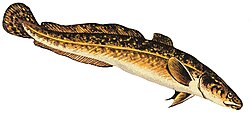vēdzele
Hello, you have come here looking for the meaning of the word vēdzele. In DICTIOUS you will not only get to know all the dictionary meanings for the word vēdzele, but we will also tell you about its etymology, its characteristics and you will know how to say vēdzele in singular and plural. Everything you need to know about the word vēdzele you have here. The definition of the word vēdzele will help you to be more precise and correct when speaking or writing your texts. Knowing the definition ofvēdzele, as well as those of other words, enriches your vocabulary and provides you with more and better linguistic resources.

Saldūdens vēdzele 
Jūras vēdzele
See also: vēdzelē
Latvian


Alternative forms
- (dialectal form) vēzele
Etymology
The origin of this word is unclear. One suggestion links it, because of the burbot's moist, slimy skin, to Old Norse vǫkr, Ancient Greek ὑγρός (hugrós), Latin ūvidus (“moist, wet”), from Proto-Indo-European *wegʷ- (“wet, to water”), with the gʷ changing to g (so as to yield Latvian dz). Another suggestion is that, if zivs (“fish”) is from Proto-Indo-European *ǵʰew-, *gʰew-, *ǵʰēw-, *gʰēw- (see zivs), then metathesis could have created the forms *wēǵʰ-, *wēgʰ-, leading to Proto-Baltic *wēž-, *wēdz-, from which Latin vēdzele, dialectal vēzele. Cognates include Lithuanian vėgėlė̃.[1]
Pronunciation
Noun
vēdzele f (5th declension)
- burbot (two fish species)
- saldūdens vēdzele ― freshwater burbot (Lota lota)
- jūras vēdzele, jūrasvēdzele ― (four-bearded) rockling (lit. sea burbot; Enchelyopus cimbrius)
Declension
Declension of vēdzele (5th declension)
| singular (vienskaitlis) | plural (daudzskaitlis) | |
|---|---|---|
| nominative (nominatīvs) | vēdzele | vēdzeles |
| genitive (ģenitīvs) | vēdzeles | vēdzeļu |
| dative (datīvs) | vēdzelei | vēdzelēm |
| accusative (akuzatīvs) | vēdzeli | vēdzeles |
| instrumental (instrumentālis) | vēdzeli | vēdzelēm |
| locative (lokatīvs) | vēdzelē | vēdzelēs |
| vocative (vokatīvs) | vēdzele | vēdzeles |
References
- ^ Karulis, Konstantīns (1992) “vēdzele”, in Latviešu Etimoloģijas Vārdnīca (in Latvian), Rīga: AVOTS, →ISBN